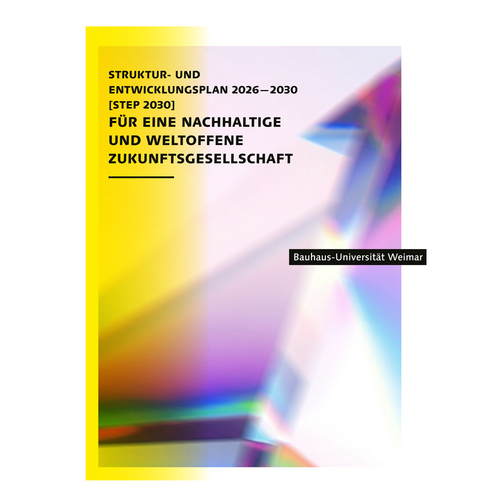»Struktur- und Entwicklungsplan (STEP)« (structure and development plan) Finalised
The Bauhaus-Universität Weimar has, through a participatory and dynamic process involving many university members and affiliates, finalised its inspiring, future-oriented »Struktur- und Entwicklungsplan (STEP)« (structure and development plan). Th plan outlines an ambitious and realistic vision for the university up to the year 2030. STEP 2030 was adopted by the University Assembly on 14 June 2024.
The text version of the plan can be downloaded here (for internal use only): https://www.uni-weimar.de/en/university/structure/presidential-board/structure-and-development-plan/
The main objective of the plan is to establish the Bauhaus-Universität Weimar as an agile, innovative and future-oriented institution that proactively adapts to new developments, challenges and opportunities. Strategic initiatives in the main fields of research, teaching, transfer and sustainability will give the university an even stronger reputation for an open, sustainable and just society:
1. Increasing and Networking Research
The Bauhaus-Universität Weimar will continue to develop its traditional thematic triangle of »People – Environment – Technology«, particularly when it comes to increasing large-scale research projects and interdisciplinary research collaborations. This will allow the university to take on a leading role in shaping both scientific and technological developments, including cultural and social aspects.
2. Artificial Intelligence Research
The university is expanding its research on artificial intelligence on the level of basic research, research-based applications and the critical, reflective assessment of its social impact.
3. Further Development of the Degree Programme Portfolio
The range of degree programmes offered will continue to adapt to meet the latest requirements until 2030. The university will specifically work towards strengthening regional and international teaching and learning partnerships with the aim of unlocking new student potential through innovative study concepts and formats.
4. Promoting Interdisciplinary and Transdisciplinary Learning Programmes and Academic Qualifications
Interdisciplinary and transdisciplinary learning opportunities are established and recognised through academic qualifications in order to promote imparting transformative competences (future skills).
5. Further Education and Recruiting Skilled Professionals
The Bauhaus-Universität Weimar understands further education as an important means of fulfilling its social transfer responsibility. The university plans to expand its lifelong learning programmes and further education Master's degree courses. Careful and prudent financial, personal and infrastructure planning will provide a solid foundation for the gradual implementation of these ambitious goals. Through regular, constructive exchanges with the various university committees, STEP 2030 is an exciting and adaptable strategy paper that will lead the Bauhaus-Universität Weimar into a promising and successful future STEP 2030 is an overall demonstration of the way in which the Bauhaus-Universität Weimar identities as a modern, future-oriented, visionary higher education institute that works with its members and affiliates to establish a sustainable, open-minded, just society. We are convinced that STEP 2030 will provide us with approaches and the direction to look to the future with courage, curiosity, and confidence, despite obvious challenges.
6. Increase the Understanding of Transfer and Transfer Activities
A wide range of transfer projects based on an inclusive and sustainable understanding of transfer that are given the appropriate support for complex, transformative processes increases the university’s external impact.
7. Boosting the City of Weimar as a Place to Study
Long-term, close collaborations with the University of Music FRANZ LISZT and other leading cultural institutions in Weimar will combine the strengths of participating partners and increase Weimar’s visibility and impact as a place to study.
8. Support for Alternative Career Paths
In addition to professorships, career paths will be created for academic staff in order to increase the appeal of the university as an employer and to attract outstanding professionals. This includes exploring new formats for permanent positions with their own specific focus or their own resources (e.g. lecturer, researcher, academic manager).
9. Optimise Administrative Processes
Support processes for research, teaching and transfer will be digitalised and automated in order to increase efficiency and seamlessly achieve a paperless administration.
10. Use Resources More Efficiently
Effectively using resources and standardised quality assurance are essential to flexible, transparent and organised operations, despite resource scarcity.
The Presidium of the Bauhaus-Universität Weimar thanks all those who contributed to the success of the STEP 2030 process.

